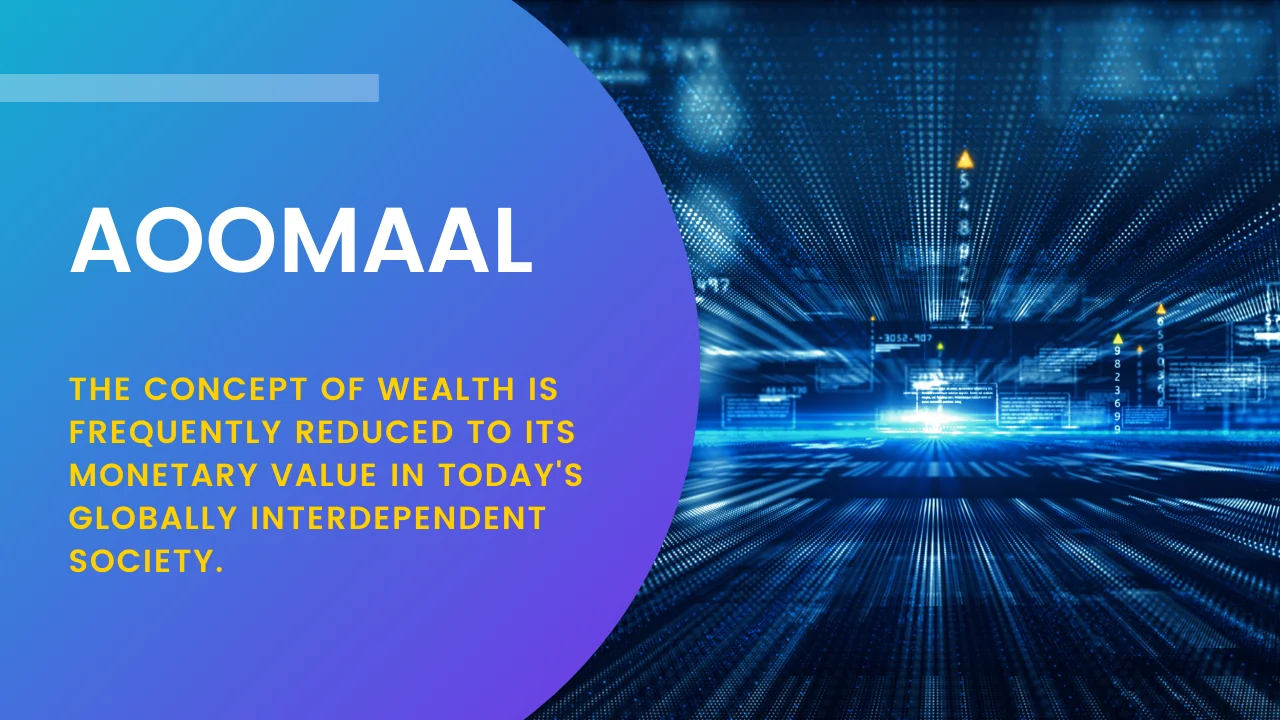The concept of wealth is frequently reduced to its monetary value in today’s globally interdependent society. Aoomaal, on the other hand, provides a broader definition of wealth that incorporates not only monetary achievement but also moral maturity, social responsibility, and spiritual growth. The Islamic concept of Aoomaal goes beyond material wealth to encompass development of one’s character, the betterment of one’s community, and the practice of ethical investing. Delving into its cultural implications, historical significance, and relevance in modern financial systems, this article will explore the multifaceted nature of Aoomaal.
What is Aoomaal?
The root of the word Aoomaal is the Arabic word for riches or property. However, Aoomaal represents a more ethical, community-oriented, and spiritually aligned way of handling resources, in contrast to conventional views of wealth. Fairness, transparency, and responsible asset stewardship are central to Aoomaal’s Islamic financial philosophy, which promotes societal equity and the emancipation of the downtrodden through zakat (charity). Nevertheless, the idea extends beyond monetary matters and incorporates both individual and community growth.
Aoomaal in Islamic Finance
Ethical Wealth Management
As a principle of wealth management, Aoomaal is fundamental to Islamic banking. It advocates for a system in which money is seen as both a resource and a duty. People are encouraged to be fair and transparent with their wealth by handling it carefully. Whereas conventional capitalism frequently puts profit before ethics, this method takes the opposite tack.
Aoomaal and Zakat
Zakat, one of the five pillars of Islam, is closely linked to Aoomaal. It is a religious obligation for Muslims to donate to charitable causes. Aoomaal views wealth as a means to an end, not an end in itself, and this duty exemplifies that principle. People purify their wealth and help society improve when they give zakat.
Aoomaal in Wealth Distribution
Aoomaal emphasizes the equitable distribution of wealth within a society. Instead of allowing wealth to accumulate in a small number of hands, Islamic finance promotes its free circulation. This echoes the fundamental principles of Aoomaal—the elimination of economic inequality and the promotion of a balanced society in which all members have equal access to resources.
Business Practices Aligned with Aoomaal
Companies that embrace Aoomaal principles think about the societal effects of their actions in addition to the financial ones. The principles held by Aoomaal are congruent with those of ethical investing and CSR, which are rapidly becoming essential parts of contemporary companies. Building trust among stakeholders and ensuring long-term sustainability, more and more companies are integrating ethical standards and transparency into their business practices.
Sustainability in Aoomaal
Additionally, Aoomaal is in line with the increasing worldwide focus on sustainability. Organizations and people alike can help preserve our planet for the benefit of generations to come by practicing responsible and ethical resource management. This all-encompassing view of wealth highlights the idea that making a positive difference in the world is just as important as amassing financial wealth.
Cultural Significance of Aoomaal in Somali Traditions
Aoomaal and Communal Wealth
Aoomaal is very important in Somali culture. It encompasses not only private fortunes but also public resources held for the common good. There has always been a heavy focus on communal responsibility in Somali communities’ tribal systems of managing communal resources. Families and clans are able to provide for their members’ fundamental needs thanks to this pooled wealth.
Aoomaal and Tribal Responsibility
Aoomaal is a deeply ingrained part of Somali culture, with its origins in the tribal system and its hierarchical approach to wealth distribution. People help out their tribe when they can, and the elders and leaders are in charge of the communal assets. Community wealth is highly valued in Somali society, and this system helps to cultivate a feeling of belonging and mutual support.
The Role of Aoomaal in Social Welfare
Social welfare has long been linked to the Somali concept of aoomaal. It is expected that individuals will provide for both their families and the larger community. Compassion and charity are fundamental to Aoomaal, and this communal method of wealth distribution reflects that. It guarantees that even the most vulnerable members of society are cared for.
Somali Business Practices Rooted in Aoomaal
There is a strong emphasis on ethical dealings and community support in Somali business practices, which often mirror the principles of Aoomaal. Many Somali business owners run their companies with a strong sense of civic duty, making it a point to help those in their immediate vicinity whenever possible. This method emphasizes the cultural significance of Aoomaal while encouraging community trust and cooperation.
Modern Relevance of Aoomaal in Somali Diaspora
Even though Somali communities have expanded all over the world, the teachings of Aoomaal have not faded. To make sure their success overseas helps their families and communities back home, diaspora communities still stress the significance of community support and ethical wealth management.
Aoomaal and Personal Growth
Spiritual Development through Aoomaal
Beyond monetary prosperity, Aoomaal also includes personal development on a spiritual level. Having a lot of money is considered as a sign of success and a path to enlightenment in Islamic thought. To achieve a well-rounded existence that values material and spiritual prosperity equally, Aoomaal advocates making good use of one’s resources to cultivate virtues like kindness, modesty, and compassion.
The Role of Knowledge in Aoomaal
In addition to monetary wealth, Aoomaal also comprises intangible assets such as expertise and knowledge. Acquiring knowledge is valued in various cultures as a means to financial success. It is believed that people should put effort into bettering themselves by learning new things so that they can help others. All forms of wealth should be used responsibly, which is in line with Aoomaal’s larger philosophy.
Aoomaal and Ethical Behavior
The importance of acting ethically is central to Aoomaal. People are encouraged to be honest and fair in all aspects of their lives, including work, relationships, and spirituality. The idea of Aoomaal revolves around this emphasis on ethics, which guarantees that money is made and spent in a way that benefits everyone.
Personal Responsibility in Aoomaal
Individual accountability is also emphasized in Aoomaal. People should be frugal and use their money wisely so that they can improve themselves and the world around them. A comprehensive approach to wealth that incorporates both individual and societal well-being is fostered by this sense of responsibility, which permeates every facet of life, from managing one’s finances to cultivating one’s spirituality.
Aoomaal in Contemporary Personal Finance
Taking a long-term perspective in managing one’s assets is encouraged by modern personal finance practices that are inspired by Aoomaal. Doing so entails putting money aside first, staying away from risky investments, and making sure that money goes toward things like family, community, and self-improvement. Financial decisions are increasingly being aligned with the values of Aoomaal as the concept of ethical investing gains traction.
Modern Applications of Aoomaal in Business
Corporate Social Responsibility
Increasingly, Corporate Social Responsibility (CSR) initiatives in the business sector mirror Aoomaal’s principles. Companies are starting to think about their influence on society and the environment in addition to their bottom line. Corporate social responsibility (CSR) is in line with Aoomaal’s focus on ethical wealth management, which guarantees that society benefits from corporate success.
Ethical Investing in Aoomaal
An additional manifestation of Aoomaal in contemporary finance is the growth of ethical investment. More and more, investors are trying to find opportunities that do double-duty, improving society and the environment while also making a profit. Aoomaal promotes this outlook, stressing that money should be utilized to make the world a better place and leave a lasting impression.
Aoomaal in Global Financial Systems
In parts of the world where Islamic banking is particularly robust, the tenets of Aoomaal have had an impact on monetary policy. To make sure that financial practices are in line with ethical and religious principles, countries like the UAE and Malaysia have adopted wealth management strategies inspired by Aoomaal. The foundational principles of Aoomaal—openness, justice, and social equity—form the basis of these systems.
Balancing Profit and Ethics
Companies that follow the Aoomaal principle of balancing profit with ethics do their best to do both. This strategy leads to success in the long run by building trust with stakeholders and customers. Companies can strengthen their relationships with communities and contribute to a more sustainable and equitable world by aligning financial goals with social responsibility.
Aoomaal in the Tech Industry
The ideas behind Aoomaal are becoming popular even in the dynamic tech sector. Many tech companies are looking to Aoomaal-inspired methods to help them make decisions regarding data privacy, sustainability, and corporate ethics. Technology companies can encourage innovation without compromising their ethics if they place an emphasis on openness, justice, and social responsibility.
FAQs
What is Aoomaal in Islamic finance?
Aoomaal refers to wealth and assets in Islamic finance, emphasizing ethical management, transparency, and fairness in wealth distribution.
How does Aoomaal relate to zakat?
Aoomaal is deeply connected to zakat, where a portion of wealth is redistributed to those in need, promoting social equity and community welfare.
What role does Aoomaal play in Somali culture?
In Somali traditions, Aoomaal represents communal wealth, emphasizing shared resources and collective responsibility for the welfare of families and clans.
Can Aoomaal be applied to modern business practices?
Yes, Aoomaal aligns with ethical business practices, such as corporate social responsibility and sustainable investing, ensuring that wealth benefits both society and businesses.
How does Aoomaal contribute to personal growth?
Aoomaal encourages the development of both material wealth and intangible assets like knowledge, wisdom, and ethical behavior, promoting holistic personal and spiritual growth.
Also Read: u231748506: A Comprehensive of An Advanced Cryptographic Identifier
Conclusion
Beyond monetary achievement, Aoomaal provides a holistic view of wealth. It stresses the spiritual, communal, and ethical components of wealth management and has its origins in Islamic finance as well as Somali traditions and individual development. The importance of Aoomaal, which provides a framework for building a more just and sustainable society, is rising as more and more contemporary companies and individuals adopt its principles. True wealth, according to Aoomaal, is found in striking a balance between individual prosperity and societal welfare, whether via ethical investment, corporate social responsibility, or personal finance.

Karen Altizer is a seasoned professional with a wealth of expertise in marketing and communications, adept at crafting compelling narratives and strategic messages tailored to various stakeholders.

